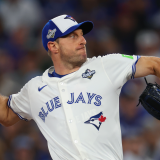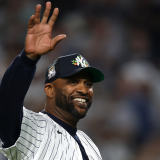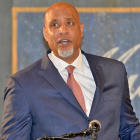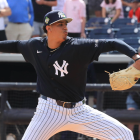MLBPA files grievance against A's, Marlins, Pirates and Rays over lack of spending
All four teams collect revenue sharing money and they are already responding
It's no secret the MLB Players' Association is upset about the lack of spending this offseason, and last week, the union took their most significant step in expressing their unhappiness.
According to Marc Topkin of the Tampa Bay Times, the MLBPA has filed a grievance against four teams, alleging they have failed to spend their revenue sharing money in compliance with the collective bargaining agreement. The four teams: Oakland Athletics, Miami Marlins, Pittsburgh Pirates, and Tampa Bay Rays.
Here are more details on the grievance, which was filed last Friday, from Topkin:
Teams are required to spend their revenue-sharing money to improve the on-field product, according to terms of the collective bargaining agreement, though not necessarily on their major-league payroll.
The Rays are considered one of the biggest revenue-sharing recipients, getting what is believed to be about $45-million a year.
MLB responded with a statement to the Times: "We have received the grievance and believe it has no merit."
...
It is not clear what the result of the grievance could be even if the teams were found to be in the wrong, as the union wants some form of compensation for players that were not signed.
The MLBPA has raised similar concerns about revenue sharing spending in the past, most notably against the Marlins in 2010. That prompted the team to sign right-hander Josh Johnson to a four-year contract extension worth $38 million. The union complained about the Pirates and Marlins last month as well, before filing the grievance.
Pirates president Frank Coonelly released the following statement in response to the grievance:
"The MLBPA's grievance against the Pirates is patently baseless. We look forward to demonstrating as much to the Arbitrator if the MLBPA continues to pursue this meritless claim. As indicated when the MLBPA first expressed its "concern" in a press release, the Pirates have always invested its revenue sharing receipts in a manner entirely consistent with the Basic Agreement. As previously indicated, our revenue sharing receipts have decreased for seven consecutive seasons while our Major League payroll has more than doubled over this same period. Our revenue sharing receipts are now just a fraction of what we spend on Major League payroll. We also have made significant investments in scouting, signing amateur players, our player development system and our baseball facilities. It is regrettable and that the MLBPA would react to a free agent market that is apparently not to its liking by filing a frivolous grievance against a Club that has continued to invest heavily in all areas of its Baseball Operations notwithstanding steadily diminishing revenue sharing receipts."
The Pirates, it should be noted, did not sign a single free agent to a guaranteed major league contract this offseason.
The A's, Marlins, Pirates, and Rays are all engaging in some sort of rebuild. The Marlins and Rays are tearing things down, the Pirates traded away Gerrit Cole and Andrew McCutchen, and the A's have never really been big spenders. Here is each team's 2017 and 2018 payroll situations, via Cot's Baseball Contracts:
2017 Payroll | 2018 Payroll (Estimated) | Change | |
Athletics | $90.0 million | $58.1 million | -$31.9 million |
Marlins | $154.9 million | $89.8 million | -$65.1 million |
Pirates | $109.5 million | $85.6 million | -$23.9 million |
Rays | $100.4 million | $77.1 million | -$23.3 million |
To be fair, every team will add payroll during the season through call-ups and midseason additions, so those 2018 payroll numbers will be higher when it is all said and done. That said, there is some serious cutting back here. And MLB is complicit to some extent because they approved the sale of the Marlins knowing full well the Bruce Sherman/Derek Jeter ownership group was planning to slash payroll.
Last year MLB's revenues reportedly topped $10 billion for the first time, so baseball is not short on cash. Also, a majority stake of the league's digital arm, BAMTech, was sold to Disney last year, and all 30 clubs will receive a $50 million payment in 2018 as a result. There is lots of money in baseball right now. Revenue is at an all-time high. It's not going to the players and ticket prices sure as heck aren't being reduced, which means owners are profiting more than ever.
It is unclear whether the MLBPA's grievance will result in any action or compensation for players. It seems unlikely. Proving revenue sharing dollars are being pocketed rather than invested in non-player entities like scouting departments will be difficult. More than anything, this the union calling attention to the lack of spending, and putting their anger -- and it is anger, don't be mistaken -- on the official record.
Baseball's revenue sharing system calls for each team to pay some percentage of their total revenue into a central fund, which is then paid out equally to the 30 teams. High revenue clubs effectively send money to low revenue clubs. In 2015 New York Yankees president Randy Levine said the team paid $90 million into revenue sharing.


















